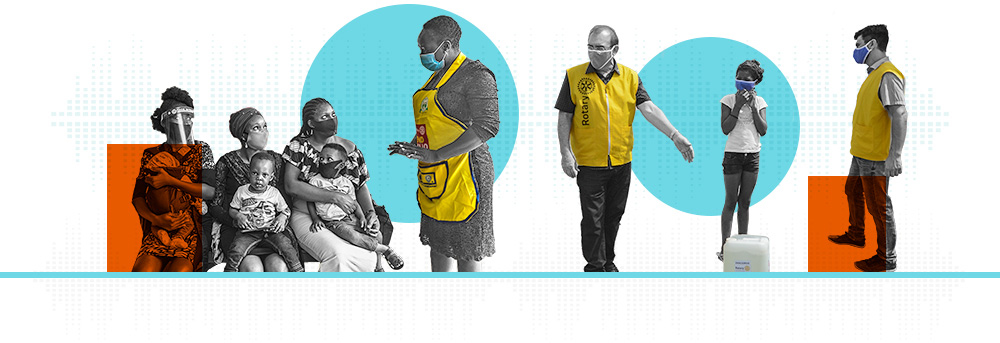By Neyeram Kukula, Rotary Club of Accra-West, Ghana
On 18 May, I joined fellow Rotary members, the project manager for the Rotary-USAID partnership in Ghana, and an engineer from Global Communities, the implementing partner, in visiting sites in the Shai Osu Doku district two hours northeast of the capital of Accra. We visited three schools where the partnership is working to improve water and sanitation facilities and change personal hygiene habits.

The team visits a primary school in the Shai Osu Doku district of Ghana.
After what felt like a never-ending journey down a rugged road, we finally arrived at our first site at the Agbuviekpong D/A Primary School. We were warmly received by Bernard Nyamado, the headmaster of the school, seated at a desk under a big tree. Nyamado resides in Volivo, a nearby community, and has been with the school for almost 10 years. He told me the isolated community has about 500 inhabitants and the school a population of 172 pupils, 80 boys and 92 girls. The school currently has a six seat toilet facility that is also used by members of the community.
Hilda Addah, a member of the Rotary Club of Accra South, asked Nyamado how the school deals with community residents using their toilets. Under the partnership, a four-seat Kumasi Ventilated Improved Pit latrine is being built. It will include a urinal for the boys and a changing room for the girls, with metal lockable gates. When asked how he would ensure that the community didn’t “invade the new toilets,” Nyamado said a compromise was in order. “We’ll engage them and have them understand that they are not supposed to use the new restrooms but they will have access to the old one.” Addah later said that she was eager to further this discussion and build the capacity of the school to engage the community.
The drilling of a borehole is another example of how the International H2O Collaboration will help the school. The school presently doesn’t have access to potable water and teachers and students fetch their water from a nearby river. The school also lacks handwashing facilities, a deficiency that can be addressed by building tippy taps. From our conversation, I gathered that the headmaster is really pleased the school was chosen as a beneficiary of the partnership and was anxious for the facilities to be completed.
Finally, Rotary and USAID are partnering to offer hygiene education with the goal of sustaining long-term behavior change. This aspect of the program is where Addah, the founder of Beyond the GoalPost, which seeks to improve the lives of children through sports with a heavy focus on sanitation, brings exceptional value. “Rotary doesn’t have a lot of people with my background,” she noted, but said she is committed and excited to volunteer her expertise in sparking hygiene behavioral change in schools.
Learn more about what Rotary is doing to provide clean water and improved sanitation, and read other blog posts about the collaboration

Hello Neyeram,
I’ve recently joined a Rotary Club in Cleveland, OH in the USA. We are currently working on a water project in El Salvador but we need a water training plan. We aren’t sure what should be included in this. Do you have access to an example one that we can review? Or know someone we can talk with who does?
Thanks for your help and keep up the great work.
LikeLike
Pingback: Improving the lives of Ghana children through handwashing | The Rotary Club of Carteret